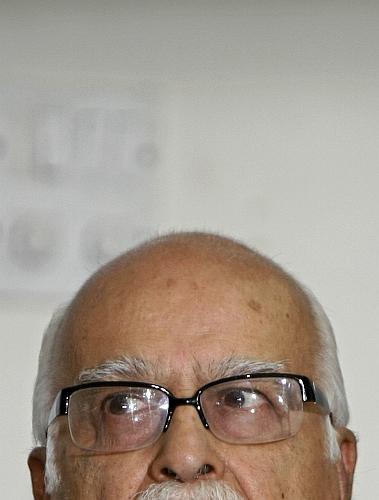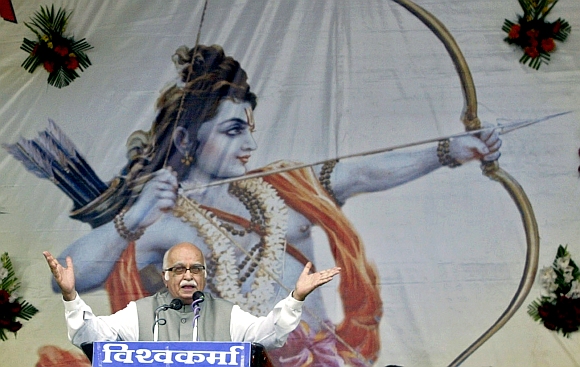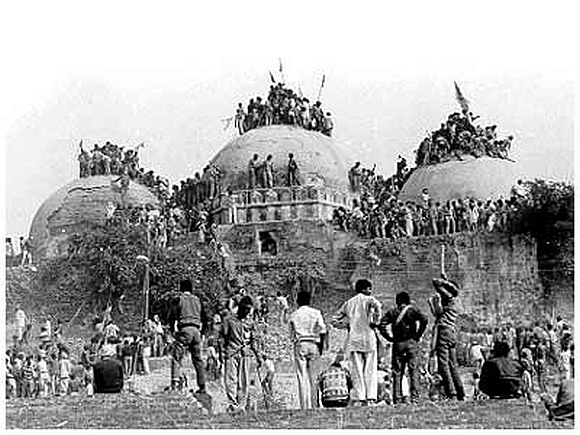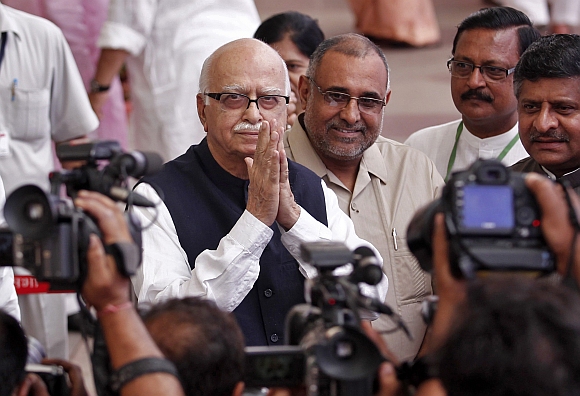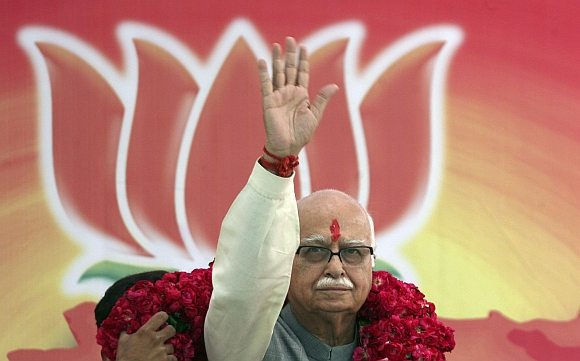 | « Back to article | Print this article |
Why we cannot write off L K Advani yet
At much personal cost, Advani is wise enough now to understand that BJP is not capable of winning 272 seats in the Lok Sabha on its own. He knows that most top leaders in the party as well as regional satraps are uneasy about an uncompromising, dictatorial leader like Modi dousing their future aspirations. He feels he still may be a compromise candidate acceptable to most allies, says Poornima Joshi
At a hotel room in Lahore during his midsummer journey to Pakistan in 2005 that cost him his job as Bharatiya Janata Party president, L K Advani seemed prepared for the tumult that he was going to cause.
Astounding as it was, he was convinced that issues that have brought the BJP closer to political power -- Ram janmabhoomi in the 1990s and the anti-Muslim riots in Gujarat in 2002 -- are best buried in the nation's consciousness.
That it was time to revel in the more presentable achievements of the BJP namely that it "ended one-party rule and established bipolar politics in India".
What struck me at the time and has been a consistent realisation since is that the BJP's patriarch has a unique ability to gloss over the ugliness and downright bigotry that was the baseline of his party's political ascendance over the years.
He is able to convince himself that neither the Ram janmabhoomi movement nor the massacre of Muslims in Gujarat were events that should define his political character. In short, what had to be done was done and what was the point of talking about it. And in any case, he did not actually have much to do with such ugly events anyway.
Click NEXT to read further...
Advani distanced himself from the Ram janmabhoomi moment
As historian Irfan Habib told me in the immediate aftermath of Advani's grand venture to project himself as a statesman, it is remarkable that a leader of a movement should endeavour to dissociate from it.
"Ram janmabhoomi was, at least to the BJP and its cadre, a political movement. They saw it in the same manner that Mahatma Gandhi led the Quit India movement or the Communists led the Telangana struggle. The difference is that Gandhi went to jail for it and the Communists were not just jailed but killed for Telangana and other uprisings.
"What is most shocking is that while BJP/Vishwa Hindu Parishad cadre are still facing criminal charges for the demolition of the mosque, Advani, the man who led the movement, has completely forgotten everyone and everything," Habib said.
Indeed, Advani touted his newly acquired secular credentials with panache; even posing himself as an advocate of the minority cause: "Do you think you are serving the cause of the Muslims by continuously harping on such issues? I firmly believe that a Hindu does not like bigotry; he does not appreciate extremism of any kind."
"Some tragic things have happened in the past and the nation has to find a way of dealing with that history. Just like there are saner ways of improving relations with Pakistan. We can talk about our shared history, the first war of Independence that we fought together in 1857. We should commemorate its 150th anniversary in 2007 together. That is a more evolved way of dealing with history."
Click NEXT to read further...
Advani dumped the Babri blame on Congress
While he was at it, he did not miss the opportunity to dump the entire blame for the demolition of the Babri mosque, an event precipitated by him alone as he rode the chariot towards Ayodhya chanting "Jai Shri Ram".
All of it, according to him, was the Congress's fault. His actions, in fact, were a reaction to the communalism practiced by the Congress; a claim that had an uncanny resonance to the Gujarat chief minister's "action-reaction" theory in relation to the anti-Muslim riots in 2002.
Take a look at what he said for a measure of how skilled Advani is in the art of disguising blatantly communal politics as justice and peace: "For a long time, the VHP was associated with the (Ram janmabhoomi) movement. Some of our people like Uma Bharti were also active in their individual capacity. But the BJP had never taken it up as a political issue.
"We believed it was a religious issue and society should resolve it on its own. The change in our attitude was brought about by the blatantly communal politics played by the Congress in the late 1980s. Immediately after the Shah Bano judgement in 1985, the Congress had adopted a stance which we had publicly appreciated. During that period, Rajiv Gandhi happened to meet me. I could sense that he would want to go for an amendment. But he went for a judicial correction instead. Having pleased Muslim fundamentalists, he decided that he should appease Hindus as well and got the structure opened. It was at that moment that we realised that the Congress is going to politicise the issue and vitiate the atmosphere.
Click NEXT to read further...'Advani's image flatters him: The reality is far worse'
"We decided to take it up as a political challenge only after these developments. As you can see, it suits people to brand us communal and look the other way when other parties raise the same issues in a far more vicious manner," he told me at the time.
Although Advani had to go through Rashtriya Swayamsevak Sangh's ritual cleansing and penitence for his 'secularisation' by way of being thrown out of the party president's office following his pronouncements on Pakistan founder Mohammed Ali Jinnah during that historical journey, the political impact was exactly what he had aimed for.
In 2009, he was accepted as a prime ministerial candidate not just by the BJP but by all the National Democratic Alliance members, including the recalcitrant Janata Dal-United. What all of it also shows is that Advani's current political profile -- that of a stubborn, ageing patriarch throwing unnecessary tantrums -- is a total misrepresentation of the man that Advani actually is.
Advani's image flatters him, as author A G Noorani wrote while reviewing his book My Country My Life. The reality is 'far worse'.
Advani has shown himself to be capable of as much political opportunism and hypocrisy as his current bete noire Narendra Modi who is presently trying to bury the stigma of the 2002 riots under a frenzied campaign, deftly handled by the corporate media, to project himself as a development man from the land of milk and honey.
Click NEXT to read further...
Advani has a few aces up his sleeve
Development and progress is Modi's Jinnah moment, a process of "secularisation" that Advani, despite what some sceptics might say, has been able to undergo with relative ease. The fact is that Advani today is a far more acceptable figure to the present as well as future allies of the BJP than Modi.
So his great disenchantment with "immorality" and public pronouncements about the lack of empathy and "self-centeredness" in the BJP's second line leadership, especially Modi, should not be seen as mere bickering of an old man. Advani has a few aces up his sleeve.
At much personal cost, Advani is wise enough now to understand that BJP is not capable of winning 272 seats in the Lok Sabha on its own. He knows that most top leaders in the party as well as regional satraps are uneasy about an uncompromising, dictatorial leader like Modi dousing their future aspirations.
Finally, he also knows that the allies will need a face-saver to join the BJP in the event of it emerging as a single largest party in the 2014 general election. That face-saver is Advani, the tiny fig leaf that "secular" leaders such as Nitish Kumar of the JD-U will need to come back to the BJP after dumping them before the elections to curry favour with the Muslim voter.
Indeed, the greatest Ram Bhakt has metamorphosed into a champion of minority rights, at least for the benefit of the opportunistic players in India's political landscape.
TOP photo features of the week
Click on MORE to see another set of PHOTO features...
